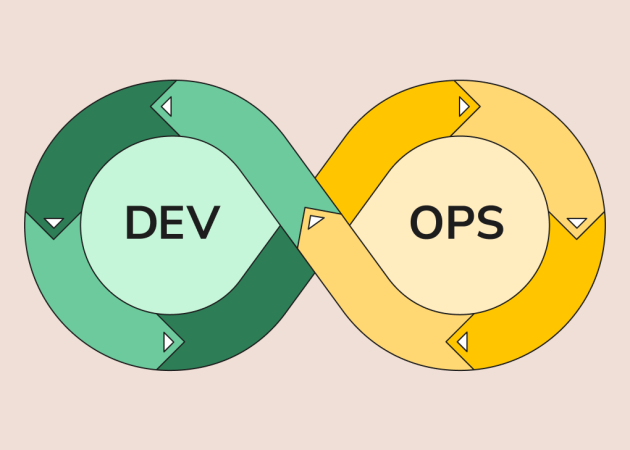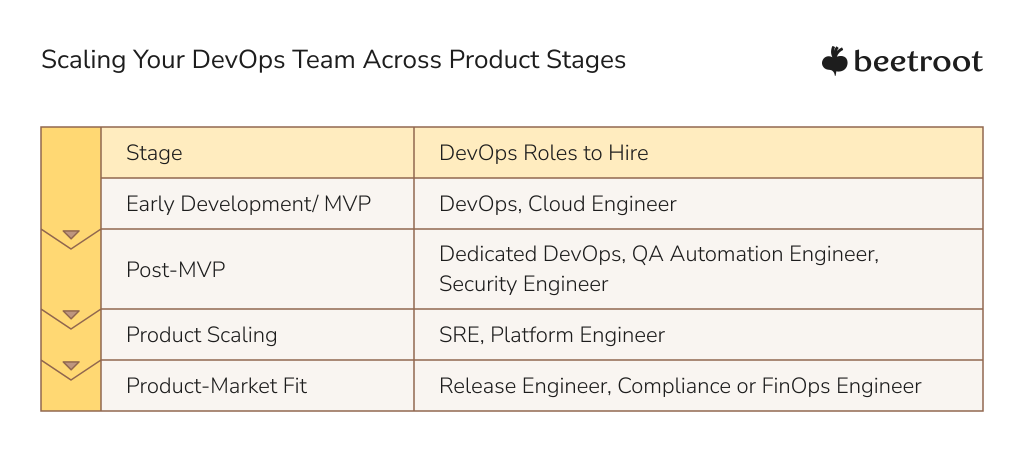
DevOps Team Roles Explained: Who You Actually Need (and When)
Contents
Contents
DevOps services help eliminate common software development bottlenecks like poor scalability, slow deployment cycles, and inconsistent environments. As optimization becomes essential for stable business growth and staying competitive, more tech companies hire DevOps roles. According to GitLab, 25% of companies are 3 to 5 years into DevOps adoption, and 37% are one to three years in.
The need for DevOps expertise is so acute that 83% of developers are involved in DevOps-related activities, even if they are not identified as DevOps. Even though traditional developers may cover some DevOps engineer roles and responsibilities, a dedicated DevOps team is more effective when CI/CD is required, the infrastructure is rapidly scaling, or security requirements are strict.
If you ever wondered what does a DevOps engineer do, this article breaks down the key DevOps team roles and responsibilities. Learn about the core tasks of a DevOps team and how they align with different project stages.
What Do DevOps Team Roles Actually Do and Why?
A DevOps team collaborates with development and operations departments to optimize the delivery of applications and services by automating the software development lifecycle. The core tasks of a DevOps team include building automated CI/CD pipelines, managing software infrastructure through Infrastructure as Code (IaC), cloud infrastructure management and optimization, containerization and orchestration, and integrating security checks as part of DevSecOps services.
Companies primarily build a DevOps team in-house or use dedicated development team services to reduce time-to-market. Faster iteration was named as one of the top benefits of DevOps/DevSecOps by 33% of the surveyed executives. Some other reasons to have a DevOps team include:
- Improved deployment frequency for more stable releases. By hiring DevOps engineer roles, companies ensure frequent, smaller releases. According to GitLab, 83% of developers release code more quickly after adopting DevOps practices.
- Enhanced software quality and fewer reworks. Automated testing integrated into the pipeline allows engineering teams to detect bugs much earlier. According to the Google Cloud report, top-performing engineering teams that meet their reliability targets are 3.7 times more likely to apply continuous testing.
- Increased developer productivity. Through software development, testing, and deployment automation, DevOps teams build self-service environments and faster feedback loops, enabling engineers to work more efficiently.
Having a DevOps team also improves cooperation between engineering departments since everyone gets a well-synchronized automated software delivery system. Standardized tooling and processes make builds and deployments more consistent and reproducible. Besides, with DevSecOps integrated within automation pipelines, DevOps also streamlines compliance with security standards.
Decoding the DevOps Team Structure: Who’s Who in DevOps?
The DevOps team is an umbrella term for a team that includes different DevOps roles and responsibilities. The actual team composition depends on the company’s maturity, the scope of the software development project, and whether development and operations teams can align processes. Small companies can have a single DevOps to cover the core optimization needs, while larger enterprises with complex infrastructures require a separate DevOps team. There is also an option to hire a third-party engineering company for hybrid support through managed DevOps services, providing more flexibility and on-demand support.
The key point is that not every DevOps team structure has the same roles and uses the same practices and tools. What each team has in common is the goal to streamline the development (Dev) and operations (Ops) in the software development lifecycle (SDLC) to achieve faster time-to-market, deployment frequency, high availability (HA) systems, and collaboration across departments. In most cases, the DevOps team roles include a DevOps engineer, a site reliability engineer, a platform engineer, an automation/release engineer, and a cloud engineer. Read more about each of them and how they collaborate below.
DevOps Engineer
The roles and responsibilities of a DevOps engineer align with the typical understanding of what DevOps entails. DevOps engineers integrate development and IT operations to reduce development time and make software delivery more efficient. The standard toolkit includes solutions for CI/CD implementation (Jenkins, GitLab CI, GitHub Actions), containerization (Docker and Kubernetes), version control (Git, GitHub, GitLab, Bitbucket), and IaC (Terraform, Ansible, and Pulumi).
Core tasks:
- Provision and adapt infrastructure components to meet the needs of users and service providers.
- Manage multiple environments, including virtual, cloud, and hybrid.
- Automate tasks with infrastructure-as-code (IaC) and CI/CD pipeline implementation.
- Monitor infrastructure performance, efficiency, and sustainability.
- Use containerization to optimize application deployment and improve scalability.
Why you need them:
A DevOps engineer will help speed up software delivery, improve deployment frequency, and synchronize the work of engineering departments. This role is critical throughout the project, from its initial stages.

Site Reliability Engineer (SRE)
An SRE engineer’s role is to build reliable systems with reduced risks to availability, latency, and efficiency. They automate IT infrastructure tasks, including application monitoring and system management. It allows tech companies to avoid crashes and errors that may impact user experience, ensuring the quality of end-user-facing services.
Core tasks:
- Automate log analysis, testing production environments, and incident response.
- Monitor and measure system reliability, including SLIs, SLOs, and error budgets.
- Design and implement observability.
- Build and test the incident management process.
Why you need them:
Companies usually hire SRE engineers to ensure their software stays reliable during frequent updates. It’s vital for scalable systems where automation is more feasible than manual management of multiple components.
Platform Engineer
Platform engineers rely on DevOps principles to create streamlined toolchains and workflows for self-service engineering capabilities. Also called an internal developer platform, these toolchains enable developers to improve software engineering productivity and be self-sufficient. Such platforms assist developers with everyday tasks, generate reusable building blocks based on common patterns and practices, and provide early advice on security issues. Platform engineering is a growing trend, with 80% of large engineering companies planning to establish platform engineering teams by 2026, up from 45% in 2022, according to Gartner.
Core tasks:
- Create and maintain self-service platforms with standardized tools and automated workflows.
- Create reusable tools and environments.
- Manage container orchestration platforms.
Why you need them:
Platform engineers create environments where other engineering team members can work more efficiently. Their contribution also improves the scalability of systems, allows companies to reduce time to market, and brings consistency to environments, resulting in better software quality.
Automation/Release Engineer
The main goal of an automation/release engineer is to automate software release processes. They work at the intersection of development, operations, and quality assurance to implement smooth release pipelines, facilitating continuous integration and delivery. Release engineers closely collaborate with development teams, DevOps, QAs, and project managers to schedule and conduct releases. Their efforts reduce manual errors in deployments and enhance release management.
Core tasks:
- Manage source code repositories and implement version controls.
- Implement release pipelines for more smooth and stable software rollouts.
- Collaborate with other engineering roles to coordinate release schedules.
- Develop policies for hotfixes and emergency releases.
- Monitor releases and solve any issues early on.
Why you need them:
Hiring an automation/release engineer makes releases more stable and helps prevent prolonged downtime. They are essential in organizations where speed, reliability, and scalability of releases are critical. These are the companies with frequent releases, products requiring 24/7 operation, and complex release cycles with multiple hardware and software versions.
Cloud Engineer
A cloud engineer designs, builds, and maintains the cloud infrastructure that DevOps will use for implementing CI/CD and scalable deployments. They ensure the infrastructure is automated, available, and secure by using services from AWS, Azure, Google Cloud, and other cloud providers. Cloud engineers closely collaborate with other team members, helping set up dev/test environments, integrate cloud-native services, and apply cloud security best practices.
Core tasks:
- Build and maintain a reliable and secure cloud-based infrastructure.
- Assist developers with cloud-based integrations.
- Monitor and manage cloud resource usage to optimize costs.
Why you need them:
Companies that rely on cloud services, either fully or partially, when building software, need cloud engineers on board to establish a cloud-based infrastructure. Cloud services offer greater scalability and easier automation than on-premise environments, which makes them a common choice for enterprises adopting the DevOps philosophy.

Some Other DevOps Roles and Responsibilities
The DevOps roles/responsibilities listed above are not the only ones you can have in a DevOps team. The actual team composition is more versatile and may include other tech specialists if the project specifics require it. Here are some other typical roles in DevOps teams:
- Security (DevSecOps) engineer. Ensures the infrastructure is secure through regular updates, patch management, and best cybersecurity practices. It can be a separate person, or DevSecOps policies are adopted across the DevOps team with shared responsibility.
- Infrastructure engineer. Builds and maintains an on-premise or virtual infrastructure and optimizes its performance. You may need a dedicated person for this role if you run a hybrid/on-prem data center.
- Compliance engineer. Implements auditing and compliance standards throughout the SDLC to ensure the system meets regulatory requirements. You may need one if you develop software for highly regulated fields like healthcare, insurance, finance, or automotive.
- FinOps engineer. Tracks cloud usage for resource and cost optimization and cooperates with engineering teams to estimate expenses. A FinOps engineer can benefit companies that face rapidly rising cloud costs and seek to reduce expenses.
- DevTestOps (QA Automation Engineer). Develops automated tests and integrates them into the CI/CD pipeline for more comprehensive automation and earlier bug detection.
Hiring Roadmap: When to Hire Each Role?
You may not need an entire DevOps team at the start of the project. Many startups cover DevOps tasks with regular engineers or have one DevOps engineer to configure everything. As your project grows and requires more advanced approaches to stay optimized, reliable, and secure, you can hire other DevOps leadership roles. Here is a concise project roadmap showing when each DevOps team role should join your team.
Early Development/ MVP
At this point, your engineering team is likely small, as is the infrastructure of the product you develop. You don’t need an entire DevOps team, and can start with a single DevOps engineer to set up a basic CI/CD pipeline and automate testing and deployments. If the project involves cloud use, it’s also time to hire a cloud engineer to configure the initial cloud architecture.
“A company should adjust the size and composition of its DevOps team to what it does right now. You don’t have to hire everyone. We often start with consulting and a single DevOps engineer, and then expand the scope of services if the project grows. It gives our clients flexibility combined with reliable support,” shares Nadiia Kravchun, Beetroot’s in-house DevOps specialist.
Post-MVP
After the engineering team finalizes the MVP and starts expanding its functionality, it’s necessary to ensure the product’s stability and security. You may need to hire a QA automation engineer and a security engineer to automate testing and build in security mechanisms. It will improve the product quality and prepare the system for further scaling. If you have used occasional DevOps services in early development, now you should already have a dedicated DevOps engineer.
Product Scaling
At the scaling stage, you should expand your DevOps team with SRE and platform engineers. They will build internal developer platforms to speed up engineering and automate software releases. These steps make the software development and deployment process more reliable and minimize downtime.
Product-Market Fit and Maturity
Once your product finds its loyal users, you can move from validating your product concept and quick growth to optimization. Consider scaling your team with a release engineer, a security engineer (if you still don’t have one), and a compliance or FinOps engineer based on your business needs. They will ensure your system is stable, secure, efficient, and regulatory compliant.

Having a separate DevOps team may be too costly for many early startups. If it’s your case, you can partner with an external engineering vendor to use specific services. Beetroot provides DevOps consulting and support at each stage of the software development lifecycle, from advisory and audits to building full dedicated DevOps teams. Use our engineering services to scale your team up or down with ease.
What You Should Remember About Hiring DevOps
Even though DevOps is often associated with a single person, in reality, it’s a set of software development and deployment practices adopted by a team. Multiple engineers take different roles to automate the CI/CD pipelines, build security, ensure stable releases, streamline the software development process, and create a solution that will be stable and meet user needs.
DevOps implementation is an ongoing process that happens throughout the project lifecycle. You may need help with different DevOps practices depending on the stage you are currently at. If you need an engineering company that can support you through this journey, drop us a line. We’ll connect you with DevOps experts who have the right skills and experience for your needs.
FAQs
What’s the main difference between a DevOps engineer and an SRE?
While a DevOps engineer focuses on optimizing software development through building CI/CD pipelines and automation, a site reliability engineer (SRE) ensures system reliability and scalability. SRE is the practical implementation of the DevOps philosophy. In small teams, these roles can overlap and be covered collaboratively.
Do I need a whole DevOps team, or can one person handle it?
The DevOps team size and composition depend on your company’s size, infrastructure complexity, and the scope of engineering tasks. A small startup with a simple infrastructure can cover all its needs with a single DevOps, while larger companies with complex environments may need a full-fledged DevOps team.
What is the most important skill for a DevOps professional?
A DevOps must have a solid technical expertise, including the knowledge of programming languages (Python, Ruby, Go, Rust), automation tools, CI/CD pipelines, containerization, cloud platforms, and configuration management tools.
Can our existing developers learn DevOps?
Yes, with expert training, you can upskill your team to cover DevOps tasks. The decision to hire a DevOps professional depends on whether you have the resources for in-house training and if the product development timelines allow for training.
How does DevSecOps fit into these roles?
A DevSecOps engineer collaborates with other team members to implement security across the development and operations lifecycle. They help build secure pipelines, set up tooling, and train other engineers to implement security best practices when building the system.
Subscribe to blog updates
Get the best new articles in your inbox. Get the lastest content first.
Recent articles from our magazine
Contact Us
Find out how we can help extend your tech team for sustainable growth.






